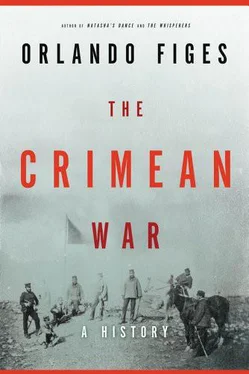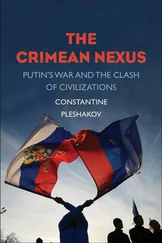A Turkish term for a woman who is dressed improperly. In the Ottoman period it was used to describe non-Muslim women and had sexual connotations, implying that the woman ran a brothel or was herself a prostitute.
It is something of a mystery as to why the Russians, faced by such a tiny defence force, did not make a quicker and more powerful attack against Balaklava. Various Russian commanders later claimed that they lacked sufficient troops to capture Balaklava, that the operation had been a reconnaissance, or that it was an attempt to divert the allied forces from Sevastopol rather than capture the port. But these were excuses for their failure, which perhaps could be explained by their lack of confidence against the allied armies on an open battlefield after the defeat of the Russian forces at the Alma.
Soimonov relied on a naval map, without any markings on the land. A member of his staff showed him the way by drawing on the map with his finger (A. Andriianov, Inkermanskii boi i oborona Sevastopolia (nabroski uchastnika) (St Petersburg, 1903), p. 15).
Woods was mistaken: the Russian Guards were nowhere near the Crimea.
A reasonable mistake to make amid the heavy fog and brushwood on the heights, where non-wounded soldiers lay down on the ground to ambush the enemy.
Tolstoy is citing the official figures passed for publication by the military censors. The true Russian losses were double that amount.
So incompetent was the commissariat that it took shipments of green, unroasted coffee beans, instead of tea, the usual drink of the troops in an Empire based on the tea trade. The process of roasting, grinding and preparing the coffee was too laborious for most of the British soldiers, who threw the beans away.
Born Princess Charlotte of Württemberg, she was received into the Russian Orthodox Church and given the name Elena Pavlovna before her marriage to the Grand Duke Mikhail Pavlovich in 1824.
The telegraphs were meant for military use; journalists were not allowed to clog them up with long reports, so there was a time lag between the headline story in a newspaper, which arrived by cable, and the full report, which came later by steamship. There were often false reports because of this – the most famous in The Times , on 2 October 1854, which announced the fall of Sevastopol on the basis of telegraph communications of the victory at the Alma and Russell’s first dispatch from the Crimea, covering the landing of the allied troops. It was not until 10 October that Russell’s full report on the Alma got to London, by which time the true situation had been clarified by further telegraphs.
The vicar Joseph Blakesley, who styled himself ‘A Hertfordshire Incumbent’, wrote so many lengthy letters to The Times , offering his learning on anything associated with the war, from the climate in the Crimea to the character of Russia, that he earned a reputation as a popular historian and was later even appointed to the Regius Professorship of History at Cambridge University, despite his lack of academic credentials.
There was some basis to the rumours about America. US public opinion was generally pro-Russian during the Crimean War. The Northern abolitionists were sympathetic towards the Western powers but the slave-owning South was firmly on the side of Russia, a serf economy. There was a general sympathy for the Russians as an underdog fighting against England, the old imperial enemy, as well as a fear that if Britain won the war against Russia it would be more inclined to meddle once again in the affairs of the United States. Relations between the USA and Britain had been troubled during recent years because of concerns in London about America’s territorial claims over Canada and its plans to invade Cuba (Clarendon had told the British cabinet that if Cuba was invaded Britain would be forced to declare war against America). Isolated in Europe, the Russians developed relations with the USA during the Crimean War. They were brought together by their common enemy – the English – although there were lingering suspicions on the Russian side of the republican Americans and, on the American side, about the despotic tsarist monarchy. Commercial contracts were signed between the Russians and Americans. A US military delegation (including George B. McClellan, the future commander of the Northern army in the early stages of the Civil War) went to Russia to advise the army. American citizens sent arms and munitions to Russia (the arms manufacturer Samuel Colt even offering to send pistols and rifles). American volunteers went to the Crimea to fight or serve as engineers on the Russian side. Forty US doctors were attached to the medical department of the Russian army. It was at this time that the USA first proposed the purchase of Russian-America, as Alaska was known, a sale that went ahead in 1867.
‘As for Constantinople, we will have it, rest assured.’
In 1857 he married Parthenope Nightingale, the elder sister of Florence Nightingale, and remained close to Florence all his life.
Not to be confused with Mikhail Gorchakov, his commander-in-chief.
Herbert’s resignation from the cabinet (as Secretary to the Colonies) came after weeks of harsh and xenophobic criticism in the British press, which had focused on his family connections to Russia. It was said, for example, in the Belfast News-Letter (29 Dec. 1854) that his mother Lady Herbert was the sister of a prince with a ‘splendid palace in Odessa’ that had been deliberately spared by the British during the bombardment of that town (in fact Vorontsov’s palace had been badly damaged during the bombardment of Odessa). In the Exeter Flying Post (31 Jan. 1855), Herbert was accused of attempting to ‘obstruct the way [of the government] and favour the designs of the Czar’.
There were many Poles who ran away from the Russian army and joined the Sultan’s forces, some of them quite senior officers who adopted Turkish names, partly to disguise themselves from the Russians: Iskander Bey (later Iskander Pasha), Sadyk Pasha (Micha Czaykowski) and ‘Hidaiot’ (Hedayat) with Omer Pasha’s army in the Danube area; Colonel Kuczynski, chief of staff of the Egyptian army at Evpatoria; and Major Kleczynski and Major Jerzmanowski of the Turkish army in the Crimea.
Taganrog had insufficient military forces to defend itself, just one battalion of infantry and a Cossack regiment, along with a unit of 200 armed civilians, in all some 2,000 troops, but no artillery. In a desperate effort to save the town from bombardment, the governor sent a delegation to meet the commanders of the allied fleet with an offer to decide the fate of Taganrog by combat in the field. He even offered to make the sides unequal to reflect the allied advantage at sea. It was an extraordinary act of chivalry that could have come directly from the pages of medieval history. The allied commanders were unimpressed, and returned to their ships to begin the bombardment of Taganrog. The entire port, the dome of the cathedral and many other buildings were destroyed. Among the many inhabitants who fled the besieged city was Evgenia Chekhova, the mother of the future playwright Anton Chekhov, who was born in Taganrog five years afterwards (L. Guerrin, Histoire de la dernière guerre de Russie (1853 – 1856) , 2 vols. (Paris, 1858), vol. 2; N. Dubrovin, Istoriia krymskoi voiny i oborony Sevastopolia , 3 vols. (St Petersburg, 1900), vol. 3, p. 191).
Читать дальше












